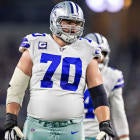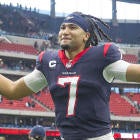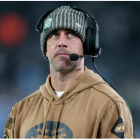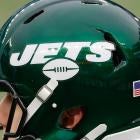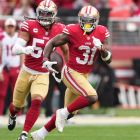RENTON, Wash. -- As Michael Bennett sat in a corner of the Seahawks' practice field on Tuesday afternoon, an idyllic view of Lake Washington behind him as he spoke to CNN's Jake Tapper via satellite, he knew he could speak out against social injustice freely, vividly, emotionally, passionately. He knew that as he spoke about his decision to sit for the national anthem during the Seahawks' preseason opener Sunday, he could be his full self and put his convictions forward in a forthright manner. And he knew that his brothers in the locker room had his back, and that upper management -- all the way to owner Paul Allen -- would support his words if not condone his actions.
That Bennett has become the new face of social activism in professional sports -- taking the mantle from Colin Kaepernick, who now can't even get a workout or a contract offer while many lesser QBs are employed -- is very much a Seattle Seahawk story. If any team is equipped to handle what will now be an international spotlight, and if any collection of men were hardwired to turn Bennett's actions into a galvanizing force rather than a divisive distraction, it's this franchise. Bennett knows that his owner understands his calling, that his general manager, John Schneider, will stand by him, and that his iconoclastic coach, Pete Carroll, will love and care for him. He knows that a legion of socially conscious teammates, past and present, from Richard Sherman and Doug Baldwin to Marshawn Lynch, are applauding him both publicly and privately for taking this stand following the tragedy in Charlottesville, Virginia, and the president's outlandish ongoing response to the violence.
So Bennett felt empowered to speak to America, via CNN's airwaves, and explain in a reasonable and profound and powerful manner why he felt compelled by his conscience to sit rather than stand when "The Star-Spangled Banner" was played before Seattle's first preseason game Sunday night. Lynch did the same the night before, when the Raiders played the Cardinals, and several Seahawks hinted they might be joining Bennett soon enough.
"Charlottesville was the tipping point for me," Bennett said into the camera, appearing pained by the state of affairs in this country. "To see so much hate. … There was no way I could go out there and hide behind the game."
Bennett would go on to make several salient points.
"Only one side is breeding hate. … I won't stand until everyone has justice. I won't stand until everyone has freedom. … There is a point where silence is becoming dishonest. … I think people thought the [anthem protest] would go away because [Kaepernick] is out of the NFL. … I can't hide behind the logo on my helmet and I can't hide behind the [NFL] shield. … I want to bring up these issues and raise these conversations. … I honor the military. I grew up in a military family and I honor the military every time I see them. … I wish more people would stand up for what they believe in. If silence is what we have to do, I can't do it anymore. … I am living this."
There was no backing down, no wavering from Bennett.
He was transparent, in a unique NFL workplace that rewards and fosters transparency. The public relations staff allowed outspoken players like Baldwin to speak at length at the podium Tuesday, knowing full well that Bennett's stance was the story of the day. Carroll spoke about the line he is straddling between knowing his player is truly sincere in his constant outreach to the community, but wishing it was manifested differently. The PR staff encouraged players to gather their thoughts and speak their minds, helping them streamline their message if they desired, but never urging them to stay silent or avoid this issue. They helped facilitate Bennett's chats with CNN and later likely MSNBC and other news networks.
In another city, on another roster, with different management, this could be a disaster, perhaps, to chemistry and such. Not here.
"Going over everything in my mind," Bennett told me after completing his CNN interviews, "and thinking about the people I work with every day like Richard Sherman, Cliff Avril, Pete Carroll, John Schneider, all of those things rolled into my mind as I thought about, 'What should I do?' It was heavy on my heart wondering, 'How can I inspire the youth? How can I change the culture?' And this is what I want to do.
"My teammates have my back. I think if I was a guy who didn't live the life I'm talking about, who didn't live trying to change people's lives, who didn't work with different cultures, who doesn't go out and do all of this stuff … but these guys know this is what I've dedicated my life to, and this is my purpose."
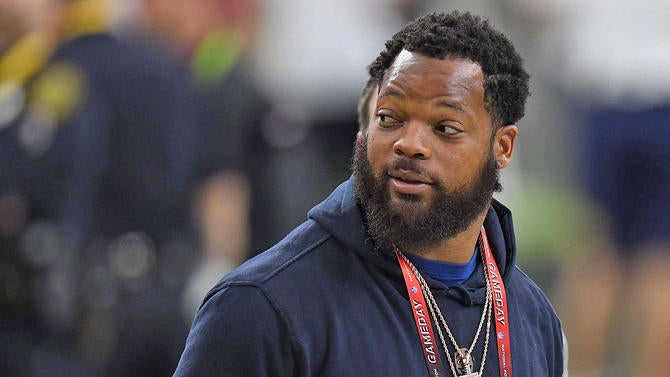
Whatever you think of Bennett's message, his sincerity is unassailable.
"My purpose in life is to create change and give people an opportunity that they lack and to be able to bring that platform. And every single day this is me. I'm not hiding behind something; I'm not faking it," he said. "This is what I do and what I believe in and this is who I am. And just as much as I could be selling my Jordan shoe or my Nike shoe, I think guys will also support me being the real me and this is just who I am."
Carroll has had several deep discussions with Bennett -- he had no idea the protest was coming Sunday night -- and they maintain an open and healthy dialogue. Carroll can offer suggestions on other ways Bennett might be able to get his point across, and he wants all of his players to stand for the anthem, but he respects the defensive end's convictions. He spoke repeatedly about Bennett's relentless outreach work whether it be in Haiti or Africa, of his work with military families in Hawaii, of his people-first worldview.
"I love our country and I think we should all stand for the opportunities when the flag is presented," Carroll said, "but his heart is in a great place and he's going to do great work well after the time he is with us and it's easy for me to support him and his issues but I think we should be standing."
After praising Bennett extensively, Carroll in no way intimated he would forbid any ongoing protest.
"He's done a lot more work than most people would be able to do in a lifetime in trying to understand where he can help. … He's a very unique person, a very amazing guy." As to Bennett's pledge to continue his protest for the foreseeable future, Carroll said: "I'm not concerned about it. We'll figure it out. Whatever we do will be the right thing for us."
Bennett's teammates know how much time and energy he spent considering whether or not to take this stand. It wasn't haphazard or hastily thought out.
"First and foremost, I know Mike's decision comes from a good place," said Baldwin, who was unequivocal about this not being an issue in Seattle's locker room. "I know Mike as a teammate and a person, and I know his heart and he comes from a good place and I thought he did an excellent job of prefacing it with his response after the game and I was really proud of him and I think we as a society should be proud.
"I think we take for granted in our country that we have freedom of speech and I think we should be proud of individuals who feel strongly about certain topics and situations that are happening in our country, and are willing to put themselves out there and be vulnerable about that, and Mike's done that. … I firmly believe the purpose and the thought behind everything is to better our society. It's not to be divisive, and it's not to be negative and I fully support Mike and his message and his thoughts and definitely the way he went about it.
Added Sherman: "There is a lot of support here from the staff and the front office and the players that liberates you in a way, and allows you to be yourself, because you know you're not walking out there on your own. And Mike knows when he did what he did that he's far from on his own."
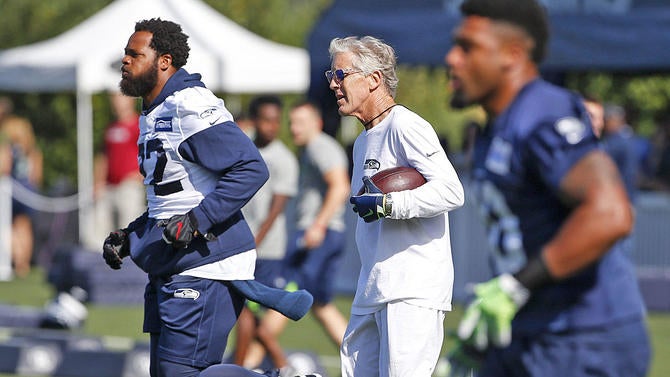
Sherman then launched into passionate defense of Bennett's right to protest and the hypocrisy of some of his critics, especially in the wake of the Charlottesville chaos.
"With what's going on in society today, freedom of speech is only free to certain people, and it's unfortunate," he said. "If you walk around with a Nazi flag and a Confederate flag and you say, 'We're displaying our rights,' people say that's their freedom of speech and that's perfectly fine. But a person protests again what Mike and Colin are protesting against, and it's outlandish and outrageous and against the truth.
"But if a Nazi flag isn't a slap in the face to the U.S. military then I don't know what is. We literally were a part of a World War and sent tons of troops to Normandy and so many soldiers lost their lives and you're saying it's OK for these people to walk around with a Nazi flag and that's just their freedom of speech, and you're more outraged by this kid sitting down during the national anthem? … He's given back to the troops and he's honored the troops every chance he gets and he's always showed tremendous respect to the military. It's not about that. I'm sure our service men and women see a Nazi flag as more of a slap in the face than somebody not standing for the national anthem."
There is something intrinsic to this team that emboldens these men. Part of it might be certain mental and emotional characteristics the Seahawks brass looks for when searching for players. Some of it is the natural byproduct of the interplay between so many bold personalities. Certainly, Carroll and Schneider nurture it with the approval of ownership and it absolutely works for this football team, which will be a Super Bowl contender again in 2017.
"We have done this for a long time, and we celebrate the uniqueness of our players in every way we can as long as they toe the line and fit in with this football team," Carroll said. "We are not disconnected in our views. We are not a disconnected group. We're a very connected group, and I think we've demonstrated that over the years. But by the same token these are young men who are growing up and trying to find their message and trying to find their heart, and I couldn't support that more.
"And I think when we do connect with who they are we can help them go further, and that's a big challenge for me and our coaches and the administrators to work to understand our guys and see what they can do. But they've got to roll with us. … We're very strict about that. And you're seeing the results of whatever it is in this culture; it's the people and the culture."
Baldwin said: "I think there's a lot to be said about the individuals that are already here, like Richard Sherman and Michael Bennett, guys who are very intelligent human beings who can articulate what they feel, who have a high emotional IQ, or EQ you could say, and they are able to articulate the way they feel. So when young guys come in and they want to express themselves or they don't know how, they can listen to Sherm, they can listen to Mike B, and they have an example, and then these guys actually ask them questions."
Baldwin said that the Seahawks are certainly unique as a franchise when it comes to empowering players to express themselves freely. That's not the case everywhere else around the NFL.
"You take into account that John and Pete have done an excellent job of bringing in these guys, and they've also cultivated this environment that allows guys to feel free and allows them to be vulnerable, and they are willing to speak up because they know this is a safe environment," he said. "And even if they are vulnerable, their teammates aren't going to look at them poorly. They're not going to judge them in an unsafe regard. And they're going to be supported by the organization, so the culture we have here definitely lends itself to players being more vocal."
That trend is not changing around here anytime soon; it suits this team and is part of the Seahawks' DNA.
If anything, Bennett's mission will further propel them, I'd posit. We can't be certain if over timer this era will look like a brief uprising of social activism, or whether a movement is truly afoot. But the already-antiquated attitude of "stick to sports" is nearing extinction. The nexus of sports and politics has long been blurred -- NFL owners serving as overseas ambassadors for presidents of both parties; Kaepernick's jersey sales being among NFL leaders despite him not having a team; teams like the Yankees having facial hair and grooming policies; the NCAA moving events due to anti-gay laws -- and players no longer need traditional media to reach millions of people with their message in an instant.
"Sports has always been a place where people said race doesn't matter and things like that didn't matter," Bennett told me, "but you look at the integration of sports and that's not really true. It took a while before there was a black quarterback. It took a while before Jackie Robinson was playing. And while things were going on in the world, even though players were playing on the same field, they rode a different bus. Even though players were staying at the same hotels they came in different entrances.
"So politics and sports have always worked hand in hand, and now we're in a generation where there is no need for traditional media. You literally can have 500,000 people in the palm of your hand, and you can't hide behind a sport anymore, because it's out front, now. It's every day. Every day you see something going on and you want to find a way to be positive and with a lot of things going on in politics, it pertains to you every single day in different ways. There's somebody in your family being affected by something that's going on, and you can't be silenced anymore. You've got to be able to inspire people to speak their mind and speak truth to what is the reality of the world."











